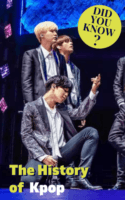Concepts, comebacks, debuts, and fandoms are all just a few terms that embody the culture of Kpop. From the biggest boy band, BTS to the biggest girl band Blackpink, these groups represent South Korea on a massive scale.
“Let it out like Dynamite.” Do these lyrics ring a bell? Did you know Dynamite is a song by the most famous Kpop group in the world?
What is Kpop?
Kpop is music from South Korea. Originally it was called gayo, meaning pop music. Recently, the term “pop,” which originally referred to British and American pop music, has been used to refer to popular music in other countries by adding it to the first letter of the country’s name, like “Kpop” of Korea. Korea.net highlights that in the mid-2000s, idol groups such as TVXQ, Kara, Big Bang, Girls’ Generation, and 2NE1 gained explosive popularity in Asia including China, Japan, Taiwan, and Singapore, which consequently triggered global interest in Kpop.
In 2012, as Psy’s “Gangnam Style” maintained its ranking as No. 2 on the Billboard Hot 100 for seven consecutive weeks and finally reached three billion views on YouTube, the K-pop craze began to spread around the world in earnest.
How did it start?
According to the website Korea.net from the mid-1990s to the mid-2000s, South Korean TV dramas and Kpop gained popularity in Asian countries such as China and Japan. This is where the term Hallyu or the “Korean Wave” came from, which referred to the global craze for Korean culture.
From the mid-2000s to the early 2010s, the Korean Wave spread led by Korean boy groups and girl groups called idol stars (we will get into that later) such as Big Bang which is known as one of the most respected and well-known bands in Korea. According to Korea.net at that time, the Korean Wave grew its fan base into the global stage, including Latin America and the Middle East beyond Asia, especially loved by young people in their teens and 20s.
The process of creating a Kpop band
It’s a long process and to understand it you need to understand the terms that are used in the culture. Kpop celebrities, which are the boys and girls in these groups, are called idols not celebrities.
According to Teen Vogue idol culture is centered on artists with massive, dedicated fanbases. Idols are usually trained by entertainment agencies in dance and vocals. Their entire image is crafted by those agencies, to only please the fans and creating relationships with their supporters.
There are strict rules many entertainers must follow because of the training they receive, and often subjected to lengthy contracts with their management groups. Often, idol training begins during performers’ teen years, when potential artists often attend performing arts high schools. The agencies that offer these trainings are called the big three. SM Entertainment (or SM Town), YG Entertainment, and JYP Entertainment. These were established in the 90s and their tried-and-true idol-making process remains a successful formula today.
The biggest part of Kpop: The fanbases/fandoms
The biggest bands in Kpop like BTS, Blackpink, Exo and Red Velvet just to name a few are known for their supportive and overprotective fandoms. If you think Beyonce’s Beyhive is overprotective then you have not met these fandoms.
Kpop is based not only on the love between the idols and the fans but the dedication as well, it can even reach a point of praise and none of these fandoms play with the love they have for their idols. BTS’s fandom’s name is ARMY. It’s known as the biggest in Kpop and also as the most toxic (to be honest most of them are toxic).
The strict rules that Kpop idols have to follow
The toxicity of fandoms comes to play here because idols are not allowed to date. The biggest reason being how possessive and intrusive fans can be of their idols. According to a gossip column Nicki Swift, some idols even have a ‘no dating’ clause in their contracts. As a result, most idols hide the fact that they are dating and when exposed it becomes a big scandal. One of the biggest examples is Blackpink’s Jennie and Exo’s Kai. A newspaper exposed that they were dating; the response was negative to say the least. CNN also points out that when it was revealed artists HyunA and E’Dawn, there was a backlash from some heartbroken fans, and their record label subsequently suspended the pair.
Idols are also not allowed to interact with the opposite gender. South Korea is a conservative nation and many things are not allowed. Even tattoos on Idols are a big taboo. When appearing on television, idols must cover their tattoos. Dieting and dressing conservatively is also part of the deal, being plus size is seen as problematic and wearing anything showing skin is also a problem. Idols are being monitored on the smallest things, and one small mistake creates the biggest scandal.
Here’s terms you know about kpop:
Trainee – before idols debut they are called trainees.
Debut – is when they are introduced to the world.
Comeback – is every time they release new music or concepts.
Maknae – is the youngest member of the group.
Aeygo – refers to cuteness.
Bias – who you consider your favourite in the group.
Visual – the most beautiful according to Korean beauty standards.
Kpop, like any industry, has rules and regulations; it’s not butterfly and roses. But like every industry, it has millions of fans who adore them, through thick and thin. If you are looking to escape reality for a few minutes, Kpop is the guilty pleasure that you need.
***
Did you know why Bonang is an inspiration? Read here to find out more…
Tell us: Are you a fan of Kpop? Who is your favourite idol?

